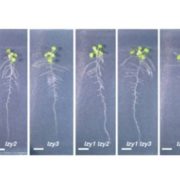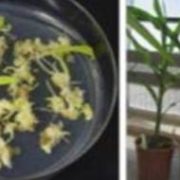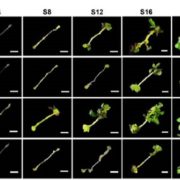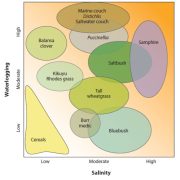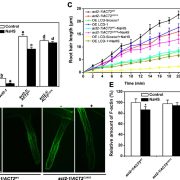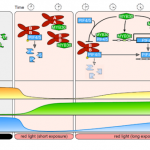“Order by disorder”- intrinsically disordered proteins (Plant Physiol.)
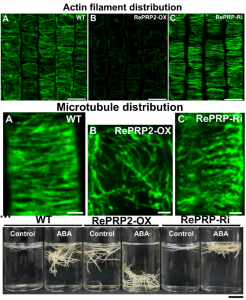 Intrinsically disordered proteins (IDP) have repetitive protein sequences but lack a defined 3D structure and are deployed to do some challenging functions that a protein with a defined 3D structure cannot perform. One such IDP, Oryza sativa REPETITIVE PROLINE-RICH PROTEIN (OsRePRP) is involved in inhibiting root growth during stress conditions. In this paper, Hsiao et al. showed the mechanism through which OsRePRP regulates root growth in response to stress. OsRePRPs are rich in proline residues (40%) and interact with cytoskeletal elements (actin and microtubules) in vitro and in vivo. Through these interactions, OsRePRP alters the abundance of filamentous actin and changes the orientation of microtubules, decreasing the molecular traffic of materials that are required for cell wall synthesis and leading to decreased cell elongation. In addition to affecting the cytoskeleton, OsRePRP promotes the activity of sucrose synthase, which converts sucrose to NDP-glucose, a precursor for starch synthesis, leading to the storage of starch in the roots. Thus, the intrinsically disordered protein OsRePRP brings “order by disorder” by adapting plants to cope up with stress conditions. (Summary by Vijaya Batthula @Vijaya_Batthula). Plant Physiol. 10.1104/pp.19.01372
Intrinsically disordered proteins (IDP) have repetitive protein sequences but lack a defined 3D structure and are deployed to do some challenging functions that a protein with a defined 3D structure cannot perform. One such IDP, Oryza sativa REPETITIVE PROLINE-RICH PROTEIN (OsRePRP) is involved in inhibiting root growth during stress conditions. In this paper, Hsiao et al. showed the mechanism through which OsRePRP regulates root growth in response to stress. OsRePRPs are rich in proline residues (40%) and interact with cytoskeletal elements (actin and microtubules) in vitro and in vivo. Through these interactions, OsRePRP alters the abundance of filamentous actin and changes the orientation of microtubules, decreasing the molecular traffic of materials that are required for cell wall synthesis and leading to decreased cell elongation. In addition to affecting the cytoskeleton, OsRePRP promotes the activity of sucrose synthase, which converts sucrose to NDP-glucose, a precursor for starch synthesis, leading to the storage of starch in the roots. Thus, the intrinsically disordered protein OsRePRP brings “order by disorder” by adapting plants to cope up with stress conditions. (Summary by Vijaya Batthula @Vijaya_Batthula). Plant Physiol. 10.1104/pp.19.01372


